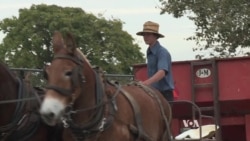When religious minorities in America are portrayed unfairly, howls of protest often ensue. But a series of reality television shows including ones with titles “Amish Mafia” and “Breaking Amish” and viewing audiences in the millions have largely been met with a shrug of the shoulders by adherents of this traditional Protestant Christian sect. After all, their faith rejects modern technology and its conveniences and most haven’t watched the show because they don’t even own a TV.
But now, some of their non-Amish neighbors are speaking up on their behalf.
“‘Jewish Mafia’ is not going to get on the air, right?’ ‘Catholic Mafia?’ ‘Muslim Mafia?’” filmmaker Mary Haverstick said in an interview at her studio in Lancaster, Pennsylvania, the heart of Amish country.
In June, Haverstick began a campaign now called “Respect Amish” after she said she had enough of the shows.
“You’re not allowed to take a religion name and target it to a very negative connotation like crime, couple it together and make a show out of it,” says Haverstick. “That’s so distasteful, offensive and - yes - bigoted, that that would be thrown out the door by every network I’ve ever heard of!”
Her campaign has received the backing of thousands of local businesses and led Pennsylvania Governor Tom Corbett to label the shows “religious bigotry” and demand they be cancelled.
The shows are produced by Discovery Channel and TLC, which are owned by Discovery Communications. The company, based in the Washington suburb of Silver Spring, Maryland, declined repeated requests to comment for this story.
“Amish Mafia,” now in its 3rd season, and the others claim to reveal this community’s scandalous secrets, including organized crime and youth debauchery. The shows cite an actual Amish school shooting in 2006 and extrapolate on the tradition of “Rumspringa” - when older youth are allowed to experiment with “worldly activities” before becoming full members of their churches.
Reality television - which began in the late 1990s with the Dutch show “Big Brother” - has become enormously popular in America. It’s a genre that invites viewers to revel in the moral failings of subjects who are presented as “real” people and not actors.
Haverstick doubts whether the people on the shows are really Amish - since their faith prohibits them from agreeing to be photographed. She says that while elements of the show may be true, they are blown out of proportion.
“In every youth culture, in any culture, there’s going to be somebody acting out,” she said. “But the partying, women drinking and acting crazy on the tables, the youth just running amok … goes against the statistics that 90 percent of them do return to the churches.”
The Amish are a Protestant Christian sect, part of the Anabaptist movement, who came to America in the 18th and 19th centuries largely from the German-speaking Alsace region of France. According to the Young Center for Anabaptist and Pietist Studies in Elizabethtown, Pennsylvania, the sect numbers 290,000 people and lives principally in Ohio and Pennsylvania, with populations in 28 other U.S. states and the Canadian province Ontario.
Theirs is a hardscrabble way of life, not unlike that of their ancestors. They don’t drive cars, and instead can be seen on country roads in horse-drawn buggies and push scooters, and out on their farms in horse-drawn plows. They prize manual labor and humility but their effort to maintain a separation from the modern world has made them an object of fascination.
“Americans have a love-hate relationship with the Amish,” says sociologist Donald Kraybill, an expert on Anabaptist groups.
“They really adore them for their strong sense of family, their strong sense of community, their strong sense of identity, their hard work ethic,” but at the same time many people perceive the Amish to feel morally superior to the world around them, he said.
“And so a program that assaults that view that the Amish are always perfect, always righteous, they’re saints that walk on water,” he says, “intrigues the public audience because then it can say, ‘Well, they aren’t as good as they think they are.’”
At the historic central market in Lancaster, Pennsylvania, Amish vendors are getting an earful about the TV shows they have never watched.
Elmer Stolfusz, a farmhand with a boyish face and engaging smile, says “lots of tourists” ask him if he is “involved with the Amish mafia.”
“I say I don’t know much about it,” he says.
“It does kind of bother us, but we still can’t let it bother us too much,” he adds. “We can still go on with our life the way it is and let people think what they think. We’re just the same as anybody else. We’re not any better than anybody else.”









